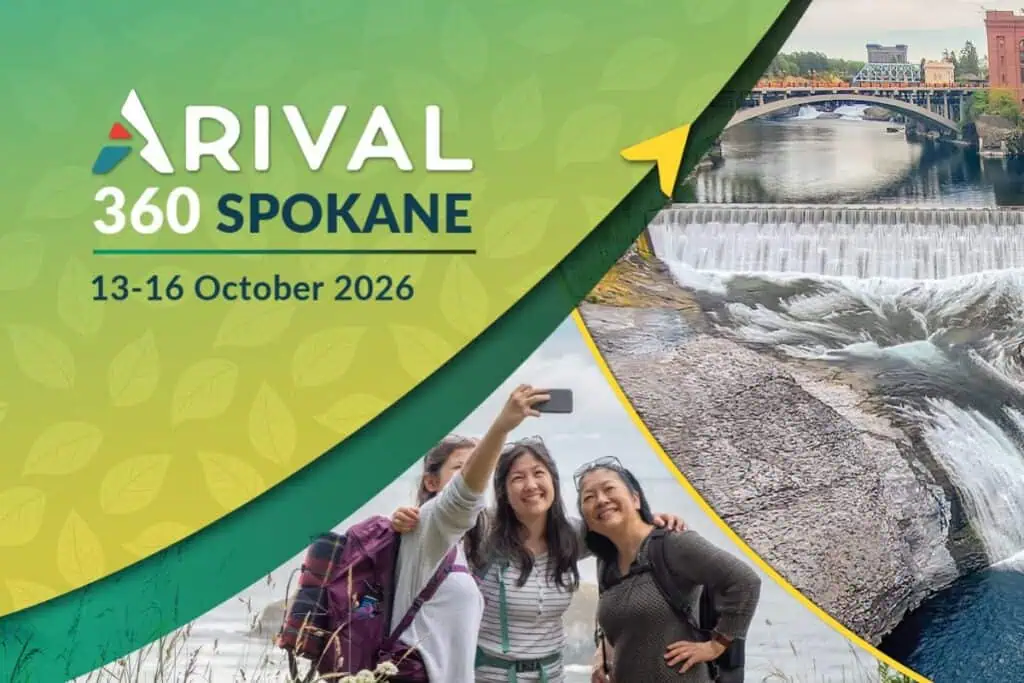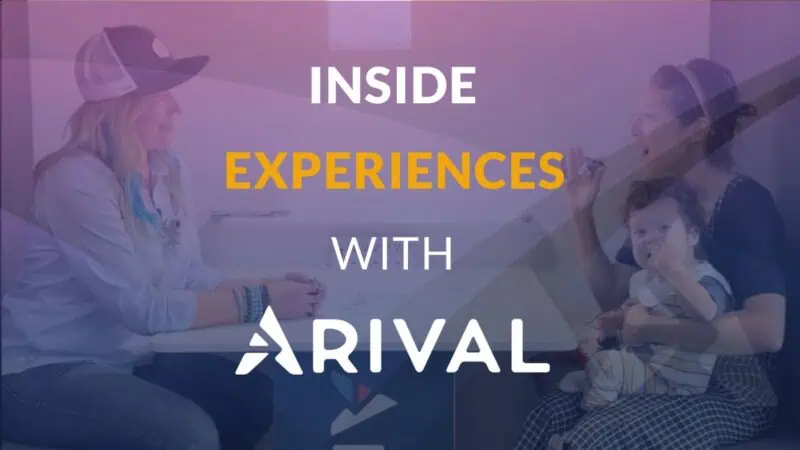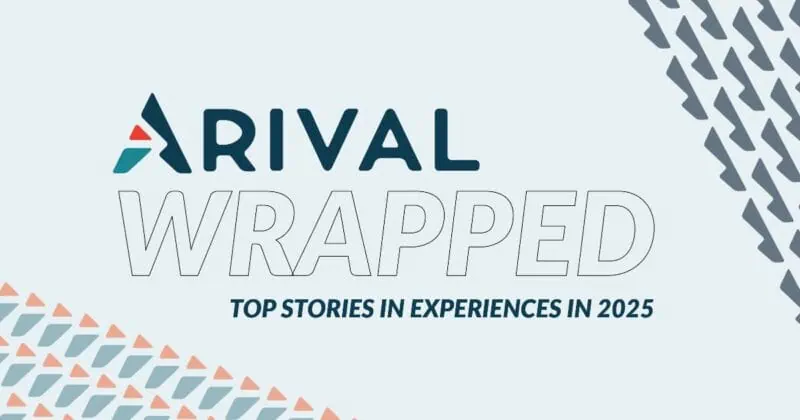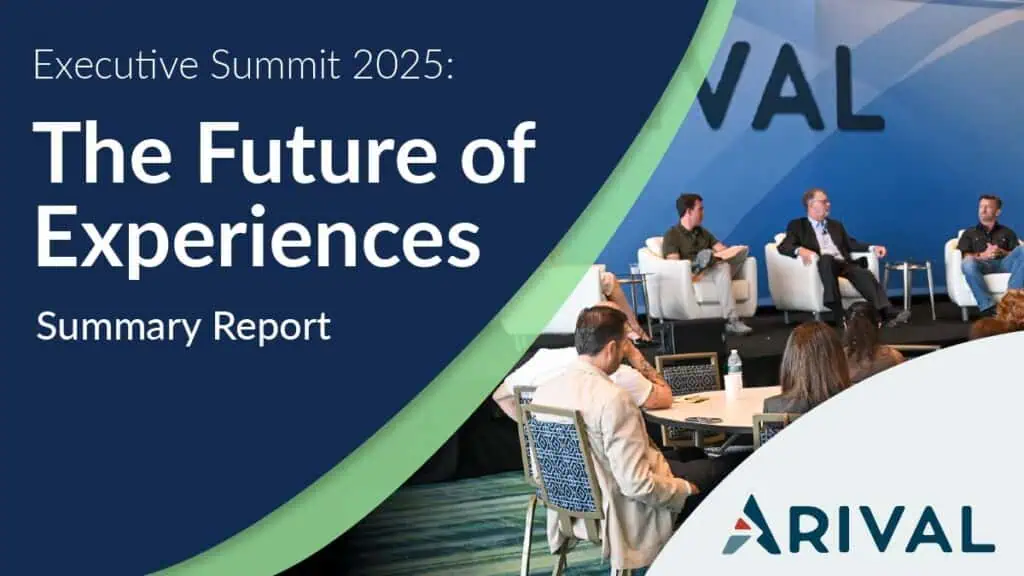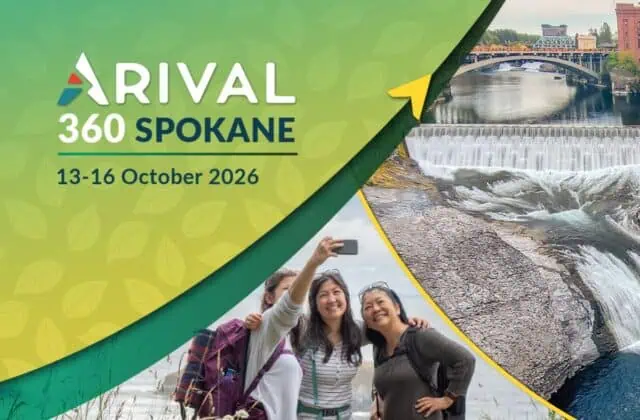Generative AI is a powerful ally to the tour operators willing to embrace it— it can help you uncover efficiencies, personalize at scale, and drive new revenue streams. However, it can be daunting to know where to even start.
This guide prepares you for the latest in generative AI for tours and activities, and how to get ahead in travel innovation with generative AI.
For a deeper dive into generative AI for travel, AI-driven experiences, how AI innovation is transforming our sector, actual tour operator use cases, and examples of integrating AI into practical workflows—from copy and chatbots to multimodal applications—join us at the upcoming AI Forum for Destination Experiences taking place alongside Arival 360 | Washington, DC.

How AI-Powered Travel Planning Enhances Tours & Activities
Today’s travelers expect recommendations that feel tailor-made. As a tour operator, you can use AI to help make that happen more quickly and more efficiently than ever before.
Take it from Google. The search engine giant has made it so travelers can now ask Gemini to help them plan their trips, a related but different approach from a search for “things to do.” Why is that a big deal? The Google AI travel planner suggests the future of inspiration, travel and itinerary planning, where embedding generative artificial intelligence into travel tech and solutions could be non-negotiable.
The Science Behind AI-Powered Experience Recommendations
Large-language models (LLMs) are behind these personalized recommendations, culling large amounts of data to synthesize information and create a relevant answer. They are great at parsing through general knowledge to answer a query or prompt, but it’s important to remember LLMs are not databases that constantly update. Your opening hours and tour departure times are not items that can be updated somewhere for the LLM to update its knowledge.
How a tour business could deliver these types of recommendations on using AI might feel challenging if not impossible. But there’s encouraging news, and it doesn’t require earning a degree in data science or learning LLMs to take advantage of AI’s capabilities.
Your owned data is more powerful than ever. Think of it as your premium AI fuel.
By looking at past bookings, reviews, and locations visited, artificial intelligence spots patterns you might miss. Try uploading reservation data (ideally six months or more) and traveler reviews to your AI tool of choice then prompt it to generate a report of trends, patterns and insights.
Standing Out in AI-Powered Search
As more travelers turn to AI tools for inspiration and AI is increasingly becoming embedded in travel planning, from AI Mode and AI Overviews on Google to AI-powered personalization on online travel agencies (OTAs), standing out online is an evolving challenge.
“We already know that website traffic is in the toilet,” says Janette Roush, Chief AI Officer with Brand USA, in an interview on The Best Part of Travel podcast. “People are not using websites to the same degree as they once did.” Roush, who will be a featured speaker at the upcoming AI Forum for Destination Experiences, explains the opportunity that presents for operators who are able to optimize their websites for AI search and take advantage of other AI tools available to them.
In an increasingly competitive landscape, artificial intelligence can also help you to differentiate yourself from your competitors, and reach new target audiences, explains Brian Nicholson, from Blend Travel Marketing:
Operator takeaway: Learn more about how to differentiate yourself online with this article featuring experts Joe Pine and Brian Nicholson on Escaping the Tour Commoditization Trap, and gain insights into the future of search engine optimization in this online session with Propellic’s Brennen Bliss.

13-16 Oct 2026
Insider Pro Access Members Save 20%
THE event of the year for creators and sellers of destination experiences to connect, learn & grow.
Get YourSuper Early Bird Ticket Through 13 January!
5 Game-Changing Ways AI is Transforming the Tour & Activity Industry
Travelers want more control and flexibility, and AI is a tool that is already making that happen. How that looks in practice is evolving, but there’s no doubt that tour operators are going to be proactive to keep up or risk becoming irrelevant in the age of AI tourism.
Here’s how tour operators are using the capabilities of AI now to get ahead.
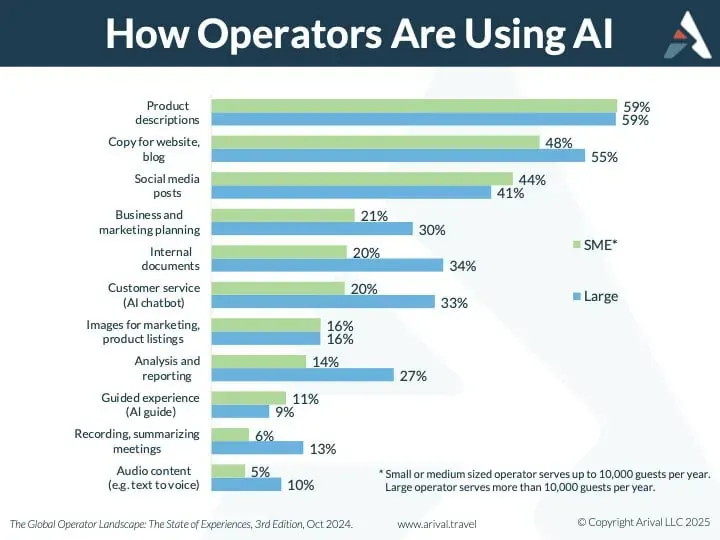
1. Tour Descriptions that Scale
Three in five tour operators are using AI to write product descriptions, followed by website copy and marketing content for blogs and social media. Rather than wrestling with writer’s block, use AI to draft tour descriptions, social posts, or email subject lines in seconds.

AI tools trained on your existing content, guest reviews, and competitive listings can:
- Optimize tone and keywords for SEO and optimal readability.
- Highlight what guests love (e.g., sunrise hikes, wine tastings) by analyzing reviews for inspirational keywords.
- Scale content creation for itineraries to account for seasonal or logistical factors.
- Monitor guest feedback—think online reviews, social posts, chat transcripts—and flag emerging issues (e.g., “slow check-in,” “overpriced lunch”).
The bottom line: Don’t be afraid to let go of some of the content development. Streamlining time-consuming writing tasks allows you the chance to focus on the parts that most operators wish they had more time for: original storytelling and personalized customer service.
2. Chatbots for Guide-Guest Communication
One of the biggest trends that continues to dominate: chatbots. They can enhance 24/7 customer support through automated review responses, email communication, and live chat.
They can also help avoid bottlenecks. Operators can implement guest communication software to help improve pickup logistics and communication with their guests.
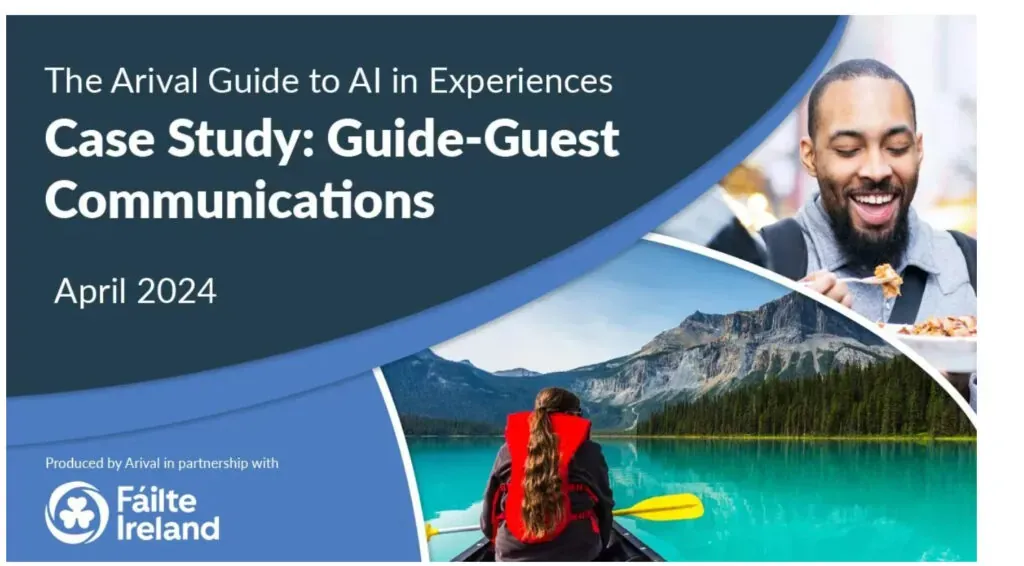
Other benefits include:
- 24/7 support without staffing costs.
- Seamless upsells (e.g., “Would you like to add skip-the-line access?”).
- Instant responses to common queries—cutting wait times and reducing cart abandonment.
3. AI Travel Assistants to Recommend your Tours
From Layla to Louise, AI-powered virtual travel assistants (aka AI concierges) continue to pop up as travel companions. These always-on bots are rapidly becoming the agents to handle the entire trip-planning process, from inspiration to booking. For tour operators, this opens up a powerful opportunity to get in front of travelers at the exact moment they’re looking for things to do.
Be sure your inventory is available and up-to-date on major online travel agency (OTA) platforms. Companies including Travel Curious are pulling that inventory through their APIs to make it bookable through hotels and airlines.
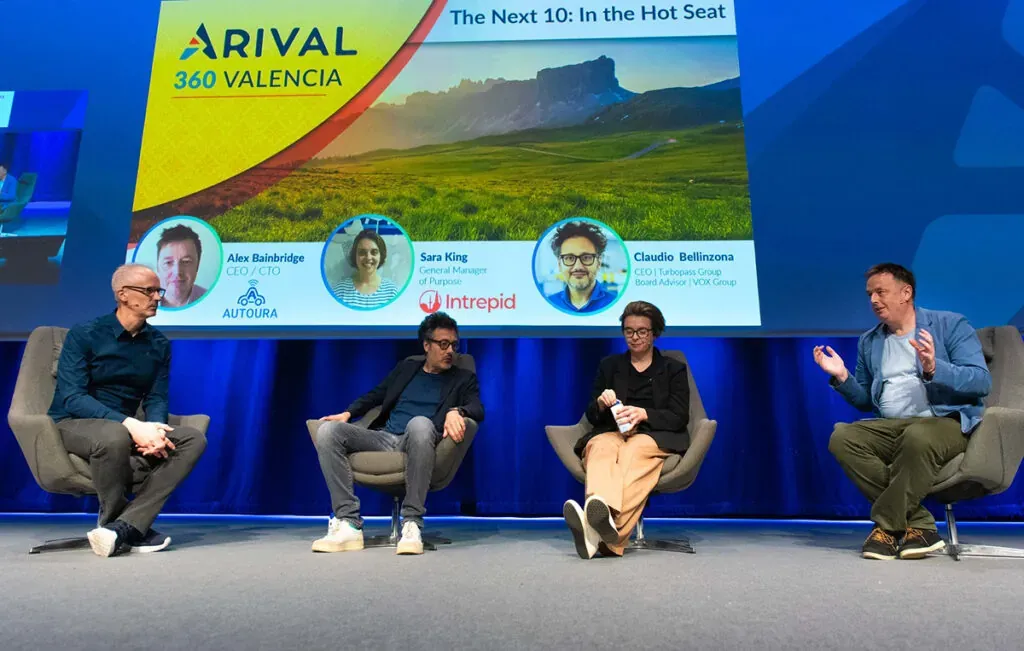
4. Personalized Recommendations Based on Behavior
Many AI-driven platforms now offer built-in personalization features that automatically suggest products based on user activity. For example, if a traveler views a food tour, the system might recommend a wine tasting or cooking class in the same location. These tools are increasingly bundled into website builders, booking engines, and CRM systems aimed at small to mid-sized businesses.
You don’t need custom code or a data scientist to offer personalized recommendations. Start with off-the-shelf tools that build intelligence into your booking process and content strategy.
- Use AI-enhanced booking systems. Platforms like Peek, FareHarbor and Bokun are among the booking systems to introduce AI-based modules that track customer behavior and recommend similar or complementary products.
- Tap into third-party distribution channels. OTAs like Viator and GetYourGuide already use AI to personalize recommendations to their users—ensure your listings are optimized and include keywords and relevant ideas in your content to take advantage of this.
- Integrate basic analytics. Even a simple Google Analytics setup or a plug-in from your CMS can help you understand what content or tours are being viewed most. Pair this with AI tools like ChatGPT to draft custom email follow-ups based on browsing behavior.
5. AI-Powered Image and Video Generation
With content being a key driver of discovery, tools like generative image and video software are helping smaller operators create professional-grade visuals for marketing. These assets not only enhance brand appeal but also reduce reliance on expensive production shoots.
Images and videos are becoming increasingly essential to capture guests’ attention. However, a word of caution: guests also value authenticity, and while it’s getting more difficult to tell the difference between AI-generated content and human-created content, over-reliance on AI-generated images to represent your experiences could backfire.
Operator Takeaway: Get the latest on how AI is transforming the travel experiences sector and learn the latest use cases for AI from leaders at the forefront of innovation at the upcoming AI Forum for Destination Experiences taking place alongside Arival 360 | Washington, DC.

Real-Time Language Translation and Cultural Insights for Tourists
Language can be a barrier for international travelers to fully enjoy local tours. AI is quickly narrowing that gap.
Beyond translation, generative AI can adapt historical and cultural narratives to suit different audiences. For example, a walking tour of Rome may emphasize architecture for European travelers and focus more on ancient mythology for North American audiences—each version auto-generated and delivered through voice or app-based guides.
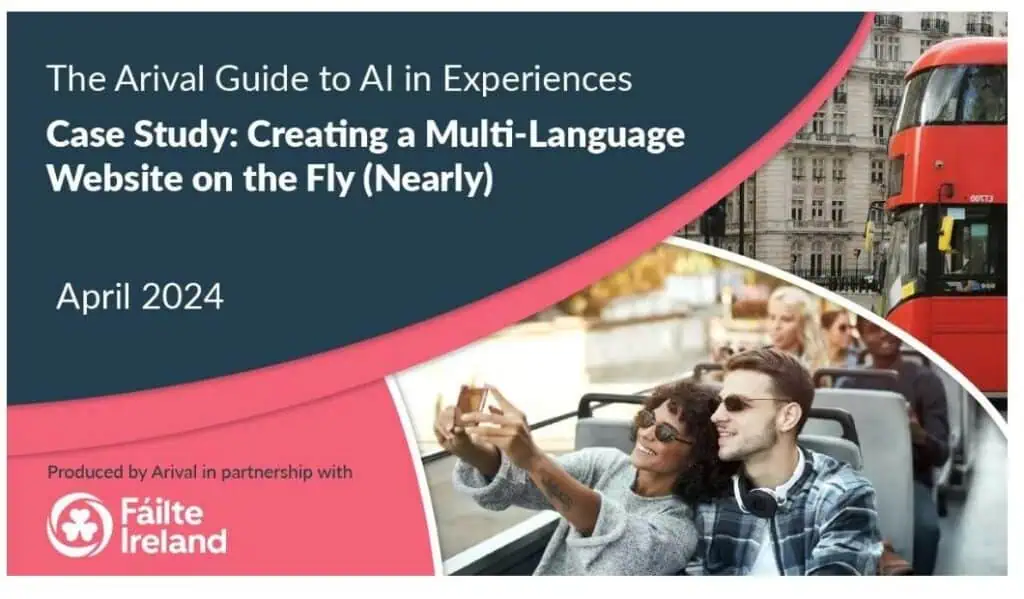
AI-powered audio guide technologies are meeting that demand—enabling operators to offer rich, inclusive experiences without hiring multilingual staff or redesigning tours from scratch.
Real-time voice translation for live and self-guided experiences
Some modern audio systems now offer AI-powered translation on demand, converting live speech or pre-recorded narration into the listener’s preferred language. Technology providers like Vox and Orpheo are experimenting with integrations that allow for real-time, multilingual delivery—either via handheld receivers or smartphone apps.
For smaller operators, pre-recorded, app-based audio tours remain a cost-effective alternative. Platforms such as VoiceMap, SmartGuide, and Clio Muse offer AI-assisted translation capabilities, making it easier to publish tours in multiple languages without hiring translators.
Operator tip: Focus on the most common languages spoken by your visitors. Start with your top two to three markets, and use AI tools to create and review translations of your scripts.
Generative AI for culturally adaptive storytelling
It’s not enough to translate content—the best experiences localize it. Generative AI tools now allow operators to tailor the tone, themes, and historical references of their audio tours to suit different cultural backgrounds. For instance, a World War II site can emphasize military strategy for one audience and humanitarian impact for another—all using the same base content adapted by AI.
Operator tip: Use AI to reframe the narrative, not just the words. Test variations of your tour that focus on themes—like food, family, resistance, or innovation—and match them to visitor profiles.
AI tools for script creation and voice synthesis
Even small teams can produce high-quality multilingual audio guides using AI. Text-to-speech technology can now generate life-like voices with accurate local accents and pacing. Platforms like WellSaid Labs and ElevenLabs let you choose from dozens of voice options—or clone your own guide’s voice for consistency across languages.
Operator tip: Start with your most popular tour. Write the script in your own voice, then use AI tools to translate and narrate. You can test multiple versions before committing to a full-scale rollout.
Expert takeaway: AI-driven audio guide platforms are no longer just nice-to-have—they’re quickly becoming essential infrastructure for reaching today’s global traveler. From translation to personalization, the right tools make it possible to offer high-quality, multilingual experiences at scale—even for small teams with limited budgets.

Predictive Analytics for Tour Pricing & Demand Forecasting
Pricing has long been one of the most difficult levers for operators to optimize. Now AI is bringing clarity—and automation—to the process, making dynamic pricing more accessible for all.
By analyzing years of booking data, weather patterns, events calendars, and even macroeconomic indicators, AI-powered tools can recommend optimal price adjustments in real time. Instead of relying on static rate cards or gut instinct, operators are beginning to adopt dynamic pricing strategies similar to those used in the aviation and accommodation sectors.
AI-Powered Itinerary Generation for Multi-Day and Custom Tours
Planning a tour—especially a multi-day itinerary—has traditionally involved juggling availability, weather forecasts, customer preferences, and logistical constraints. AI is changing that. With the ability to analyze real-time data and dynamically adjust plans, AI-powered itinerary planning tools are offering travelers more personalized and responsive experiences than ever before.
At the same time, they’re reducing the operational burden for tour operators—automating what was once a manual, time-consuming task.
Today’s AI-driven itinerary systems go beyond basic schedule builders. They can:
- Adjust in real time to weather, traffic, locations and local events.
- Match activities to traveler profiles such as families, solo adventurers, or food lovers.
- Balance pace and diversity, ensuring itineraries feel thoughtful and well-paced.
Case study: VisitScotland’s Dynamic Story-Driven Itineraries
VisitScotland’s chief executive Vicki Miller has big plans for how the tourism organization uses AI. VisitScotland has begun experimenting with generative AI to help travelers design dynamic, themed itineraries based on both their interests and real-time travel conditions. In a recent pilot, the national tourism board worked with an AI provider to create persona-driven journey planners. Visitors could choose an identity—such as “the Adventurer” or “the Romantic”—and receive a multi-day itinerary tailored not just by theme, but by weather, travel style, and accessibility.
As conditions changed, so did the itinerary: if rain closed a hiking trail, a museum or distillery visit was automatically slotted in. The system also suggested hidden-gem stops and locally run businesses—extending tourism benefits beyond major hubs.
Implementing AI: Where to Start and How to Succeed
You don’t need enterprise budgets to benefit from AI. Start small with ideas from this guide—automating descriptions, testing AI-generated itineraries, or integrating chat support.
Prioritize tools that solve your most time-consuming problems. Track KPIs like booking volume, upsells, and customer satisfaction to measure ROI. With the right partners and clear goals, even lean teams can make meaningful progress.
Wondering where to start? Get insights on AI tools for travel here, and check out this article by Carpe Diem Tours’ Oliver Green, on 5 Tour Operator Use Cases for AI & Automation, which includes a recommended AI tech stack for operators.
Why Transparency Will Define AI’s Role in Travel
As AI becomes more embedded in travel experiences, trust becomes a competitive advantage. Travelers want to know how their data is used—and that recommendations aren’t just automated, but ethical. Clear communication, opt-ins, and privacy-first design aren’t just best practices—they’re expectations. Operators that prioritize transparency will earn long-term loyalty in an AI-powered world.
About the Author

Kate Cornell is an editorial and digital strategist with many years of experience in the experiences sector of travel, and has spoken at Arival on the topics of writing tour descriptions, and the “content conundrum.” She has led global editorial teams for travel brands including Viator and Tripadvisor, helped build startups such as TourismSolved, and worked behind the scenes as a content consultant for leading travel and luxury brands.
Learn How to Get Practical with AI at the AI Forum for Destination Experiences
Learn more about generative AI for travel, with a special focus on AI usage for tour operators at the AI Forum for Destination Experiences, happening alongside the Arival 360 | Washington, DC event this 29-30 September. Join industry leaders, AI innovators, and tours, activities and attractions professionals for an immersive event dedicated to the transformative power of GenAI on destination experiences.

Become an Insider Pro Access member today and get access to the full library of Arival research, plus many other benefits such as free consulting sessions, special discounts and 20% off in-person events, starting from $179 per year.
Sign up to receive insights tailored for the in-destination industry as well as updates on Arival.
Header photo: AI-generated using Canva AI




